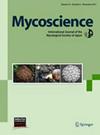<i>益母草</i>11月,一种来自中国的新型白粉病
IF 1.4
4区 生物学
Q4 MYCOLOGY
引用次数: 0
摘要
在中国菊科Leontopodium leontopodioides上发现了一种白粉病。利用内部转录间隔序列和28S rDNA序列进行的系统发育分析表明,该物种与N. galii、N. geranii和N. nevoi有亲缘关系,是Neoerysiphe joerstadii的姊妹种。与近缘种joerstadii相比,该物种在叶柄数量和大小上存在差异(3-10叶柄,55-75 × 20-40 μm; 16-32叶柄,40-60 × 20-30 μm)。该种在形态上与N. gnaphalii非常相似,但明显不同于该种的是有较大的裂口和无色的附属物。因此,在leontopodiides上的白粉病被描述为N. leontopodii sp. nov。本文章由计算机程序翻译,如有差异,请以英文原文为准。
<i>Neoerysiphe leontopodii sp.</i> nov., a new powdery mildew from China
A powdery mildew was found on Leontopodium leontopodioides (Asteraceae) in China. Phylogenetic analyses using a combination of internal transcribed spacer and 28S rDNA sequences showed that this species, which clusters as sister to Neoerysiphe joerstadii, is allied to N. galii, N. geranii, and N. nevoi. This species differs from the closely allied N. joerstadii in the number and size of asci (3–10 asci, 55–75 × 20–40 μm versus 16–32 asci, 40–60 × 20–30 μm). This species is morphologically very similar to N. gnaphalii, but clearly differs from this species in having larger chasmothecia and colorless appendages. Therefore, the powdery mildew on L. leontopodioides is described as N. leontopodii sp. nov.
求助全文
通过发布文献求助,成功后即可免费获取论文全文。
去求助
来源期刊

Mycoscience
MYCOLOGY-
CiteScore
3.00
自引率
7.10%
发文量
32
审稿时长
3 months
期刊介绍:
Mycoscience is the official English-language journal of the Mycological Society of Japan and is issued bimonthly. Mycoscience publishes original research articles and reviews on various topics related to fungi including yeasts and other organisms that have traditionally been studied by mycologists. The research areas covered by Mycoscience extend from such purely scientific fields as systematics, evolution, phylogeny, morphology, ecology, physiology, biochemistry, genetics, and molecular biology, to agricultural, medical, and industrial applications. New and improved applications of well-established mycological techniques and methods are also covered.
 求助内容:
求助内容: 应助结果提醒方式:
应助结果提醒方式:


